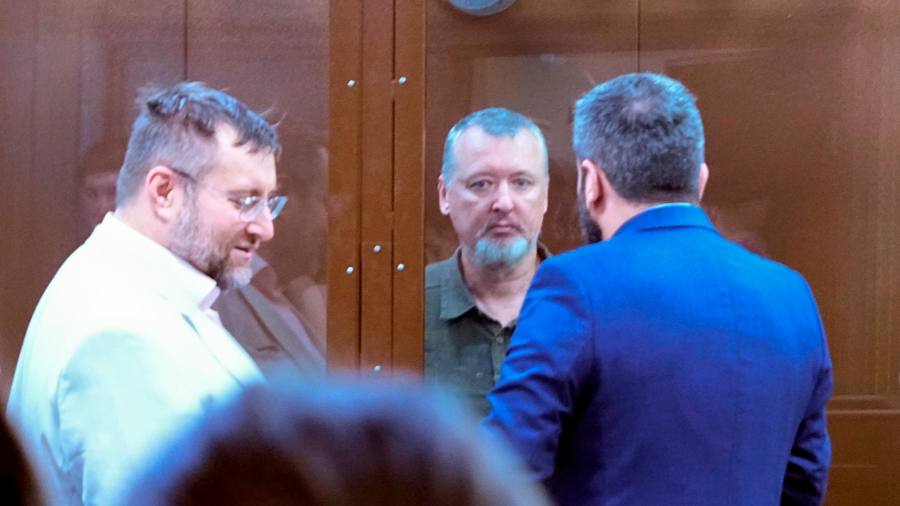Receive free Russian politics updates
We’ll send you a myFT Daily Digest email rounding up the latest Russian politics news every morning.
Russian security services have detained Igor Girkin — a supporter of the war against Ukraine who has become a vocal critic of how the Kremlin has handled the invasion — and accused him of extremism.
Girkin, a prominent nationalist and former FSB intelligence officer who led Russia’s covert invasion under the guise of support for separatists in eastern Ukraine in 2014, became increasingly scathing in his criticism of Moscow’s handling of the full-scale campaign launched nearly 17 months ago, and has called for Vladimir Putin to step down as Russian president.
Russian state media on Friday showed pictures of Girkin in a Moscow courtroom behind a glass wall. It said the state was accusing Girkin of “public calls to carry out extremist activities on the internet”.
The move against Girkin, who is also known by his nom de guerre Strelkov, comes as the Kremlin cracks down on critics on its nationalist flank who support the war in principle but have become loudly critical of the Russian army’s battlefield failures.
“Angry patriots” such as Girkin have been in the spotlight after Wagner militia boss Yevgeny Prigozhin led a mutiny on Moscow last month. General Sergei Surovikin, another favourite in nationalist circles, was swiftly detained after the June 23 mutiny and has not been heard from in public since.
Girkin called for Putin’s downfall this week. “The country cannot survive another six years of this cowardly low-life in power,” he wrote on his Telegram channel, which has almost 900,000 subscribers. Girkin’s wife Miroslava Reginskaya announced his detention on the same channel on Friday.
Reginskaya said she had learned “from friends” that Girkin had been charged with extremism by the security services. “I do not know anything about my husband’s whereabouts,” she added.
“This is a moment many within the siloviki have eagerly awaited,” said Tatyana Stanovaya, a senior fellow at the Carnegie Russia Eurasia Center, referring to the group of security hawks around Putin. The former officer “had overstepped all conceivable boundaries a long time ago, sparking the desire among security forces — from the FSB to military chiefs — to apprehend him”.
“This is a direct outcome of Prigozhin’s mutiny: the army’s command now wields greater political leverage to quash its opponents in the public sphere,” Stanovaya said. “It’s unlikely that there will be massive repressions against ‘angry patriots’, but the most vehement dissenters may face prosecution, serving as a cautionary tale for others.”
Girkin, who described himself as the man who “pulled the trigger of war” in Ukraine when his forces invaded the Donetsk city of Slovyansk in April 2014, also played a role in Russia’s annexation of Crimea a month earlier.
Girkin ruled Slovyansk with an iron first during the nearly three-month Russian occupation of the city. Documents recovered by journalists after he fled with his soldiers to Donetsk city in July 2014 showed that Girkin had overseen military “tribunals” that sentenced three local men to death by firing squad. It was later reported that Girkin had ordered executions of at least six people and had admitted to killing one himself.
After his retreat, Girkin was made “defence minister” for the area of Donetsk region under Russia’s control.
Girkin was one of four men connected to Russia’s military who were found guilty in absentia by a Dutch court last November and sentenced to life in prison for their roles in the downing of Malaysia Airlines flight MH17 over eastern Ukraine on July 17 2014.
The Kremlin ordered Girkin back to Moscow a month after the aircraft attack.
Girkin has had sanctions imposed on him by the UK, US, EU, Australia, Japan, Canada and Switzerland for his part in Russia’s nine-year-long intervention in Ukraine.
He tried on several occasions to return to the frontline in occupied Ukraine since Russia’s full-scale invasion but was turned away by Russia’s military leadership each time.
A statement posted on Friday on Girkin’s Telegram channel, claiming to be penned by his supporters, expressed dismay at his arrest.
Girkin had “openly and reasonably” criticised Putin and the Kremlin, the unnamed authors said, because freedom of speech was guaranteed by Russia’s constitution. “Today, confidence in this has been undermined.”
The statement said Girkin’s arrest coincided with “an attempt to break up the Club of Angry Patriots” which “carries extremely negative consequences for the stability of the country” in the context of the Ukraine war.
Others in the pro-war, patriotic camp also warned of the anger Girkin’s detention was likely to cause.
“You can have all kinds of disagreements with Igor Strelkov, but the authorities must realise that with such actions they are introducing even more discord into the patriotic community of a country at war,” said Alexander Pelevin, a writer known as a “Z-poet” for his support of the war in Ukraine.
Credit: Source link











